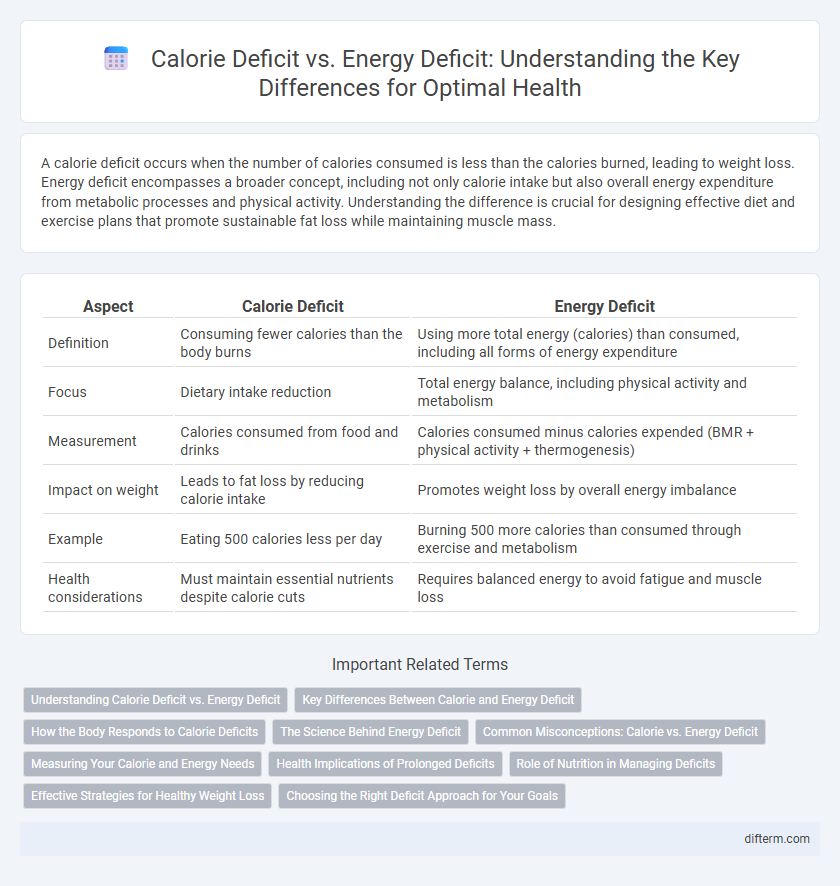A calorie deficit occurs when the number of calories consumed is less than the calories burned, leading to weight loss. Energy deficit encompasses a broader concept, including not only calorie intake but also overall energy expenditure from metabolic processes and physical activity. Understanding the difference is crucial for designing effective diet and exercise plans that promote sustainable fat loss while maintaining muscle mass.
Table of Comparison
| Aspect | Calorie Deficit | Energy Deficit |
|---|---|---|
| Definition | Consuming fewer calories than the body burns | Using more total energy (calories) than consumed, including all forms of energy expenditure |
| Focus | Dietary intake reduction | Total energy balance, including physical activity and metabolism |
| Measurement | Calories consumed from food and drinks | Calories consumed minus calories expended (BMR + physical activity + thermogenesis) |
| Impact on weight | Leads to fat loss by reducing calorie intake | Promotes weight loss by overall energy imbalance |
| Example | Eating 500 calories less per day | Burning 500 more calories than consumed through exercise and metabolism |
| Health considerations | Must maintain essential nutrients despite calorie cuts | Requires balanced energy to avoid fatigue and muscle loss |
Understanding Calorie Deficit vs. Energy Deficit
Calorie deficit refers specifically to consuming fewer calories than the body expends through basic metabolic functions and physical activity, leading to weight loss. Energy deficit encompasses the broader concept of the total energy imbalance, including calories burned from exercise, basal metabolic rate, and non-exercise activity thermogenesis (NEAT). Understanding the distinction helps in creating effective weight management strategies by targeting both dietary intake and overall energy expenditure.
Key Differences Between Calorie and Energy Deficit
Calorie deficit specifically refers to consuming fewer calories than the body expends, leading to weight loss by tapping into stored fat. Energy deficit encompasses not only calories but also the overall balance of macronutrients and metabolic processes influencing the body's total energy expenditure. Understanding these differences helps optimize diet and exercise regimens for effective fat loss and metabolic health.
How the Body Responds to Calorie Deficits
When the body experiences a calorie deficit, it begins to use stored fat for energy, leading to weight loss. This energy shortfall triggers metabolic adaptations such as a slower resting metabolic rate and increased hunger signals to conserve energy. Prolonged calorie deficits can also result in muscle loss if protein intake is insufficient or resistance training is not maintained.
The Science Behind Energy Deficit
Energy deficit occurs when the body expends more energy than it consumes, leading to weight loss by tapping into stored fat reserves. Unlike a simple calorie deficit, energy deficit accounts for all energy expenditures including basal metabolic rate, physical activity, and thermic effect of food. Scientific research highlights that maintaining an energy deficit reliably promotes fat loss while supporting metabolic functions essential for overall health.
Common Misconceptions: Calorie vs. Energy Deficit
A calorie deficit specifically refers to consuming fewer calories than the body expends, leading to weight loss, while an energy deficit encompasses not only calorie intake but also the body's total energy expenditure, including basal metabolic rate and physical activity. Common misconceptions arise when calorie deficit is oversimplified as the only factor in fat loss, ignoring how energy balance involves complex metabolic processes like thermogenesis and hormonal regulation. Understanding the distinction between calorie deficit and overall energy deficit is crucial for creating effective, sustainable weight management strategies.
Measuring Your Calorie and Energy Needs
Accurately measuring your calorie and energy needs involves calculating your Basal Metabolic Rate (BMR) and accounting for physical activity levels to establish a precise calorie deficit for weight loss. Tools like indirect calorimetry and wearable fitness trackers help monitor energy expenditure, ensuring your calorie intake supports sustainable fat loss without compromising metabolism. Tailoring your calorie deficit based on real-time energy needs promotes effective and healthy body composition changes.
Health Implications of Prolonged Deficits
Prolonged calorie deficit can lead to nutrient deficiencies, muscle loss, and impaired metabolic function, increasing the risk of weakened immunity and chronic fatigue. An extended energy deficit disrupts hormonal balance and may cause adverse cardiovascular effects, negatively impacting overall health. Maintaining a balanced approach to deficits supports sustainable weight management and preserves essential physiological functions.
Role of Nutrition in Managing Deficits
Calorie deficit refers to consuming fewer calories than the body expends, while energy deficit accounts for overall energy imbalance including calories burned through metabolism and physical activity. Proper nutrition plays a crucial role in managing these deficits by ensuring adequate intake of essential macronutrients and micronutrients to support metabolic functions and prevent muscle loss. Balanced meals rich in proteins, healthy fats, and complex carbohydrates optimize energy utilization and sustain healthy weight management during calorie or energy deficits.
Effective Strategies for Healthy Weight Loss
Creating a calorie deficit by consuming fewer calories than the body expends is a fundamental strategy for effective weight loss, ensuring fat loss while preserving muscle mass. Incorporating balanced nutrition with adequate protein intake and regular physical activity optimizes energy deficit without compromising metabolic rate or overall health. Monitoring macronutrient distribution and maintaining sustainable habits promotes long-term success in healthy weight management.
Choosing the Right Deficit Approach for Your Goals
Calorie deficit primarily focuses on the reduction of caloric intake to promote weight loss, while energy deficit encompasses both calories consumed and calories expended through physical activity. For sustainable fat loss, selecting an energy deficit tailored to your basal metabolic rate and daily activity level ensures a balanced approach that supports muscle preservation and overall metabolism. Tracking macronutrient intake alongside energy expenditure provides a more precise framework for achieving specific health and fitness goals.
calorie deficit vs energy deficit Infographic

 difterm.com
difterm.com